

Japan protests Chinese ships entry into waters near disputed isles. PHNOM PENH Wed Jul 11, 2012 3:53pm IST.
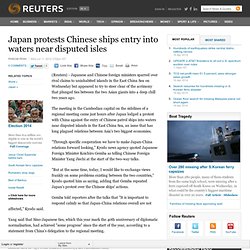
The Global Power Shift from West to East. WHEN GREAT powers begin to experience erosion in their global standing, their leaders inevitably strike a pose of denial. At the dawn of the twentieth century, as British leaders dimly discerned such an erosion in their country’s global dominance, the great diplomat Lord Salisbury issued a gloomy rumination that captured at once both the inevitability of decline and the denial of it. “Whatever happens will be for the worse,” he declared.
“Therefore it is our interest that as little should happen as possible.” Of course, one element of decline was the country’s diminishing ability to influence how much or how little actually happened. Obama's Asia 'Bluff' When a leading expert on military affairs recently told a Brookings Institution meeting that President Obama’s much-touted pivot to Asia was “a bluff,” I considered the statement way off the mark.
But since then, I have concluded that there is indeed less to Obama’s grand change in strategy than meets the eye. In fact, the pivot makes little sense. This suggests that one ought to look for domestic explanations. Why NATO Is a Pacific Power. The culmination of an invigorated NATO-Japan relationship should be the establishment of a liaison office in Tokyo.
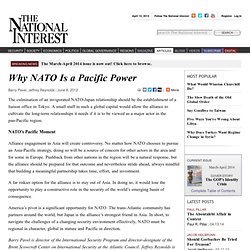
A small staff in such a global capital would allow the alliance to cultivate the long-term relationships it needs if it is to be viewed as a major actor in the pan-Pacific region. NATO’s Pacific Moment Alliance engagement in Asia will create controversy. No matter how NATO chooses to pursue an Asia-Pacific strategy, doing so will be a source of concern for other actors in the area and for some in Europe. Pushback from other nations in the region will be a natural response, but the alliance should be prepared for that outcome and nevertheless stride ahead, always mindful that building a meaningful partnership takes time, effort, and investment.
A far riskier option for the alliance is to stay out of Asia. America’s pivot is a significant opportunity for NATO. About that Pivot to Asia. Leon Panetta with Ng Eng Hen, Singapore's defense minister.At the start of his long journey across Asia, Secretary of Defense Leon Panetta told the Shangri-La Security Dialogue that the United States would play a greater role in the security of the Asia-Pacific region.
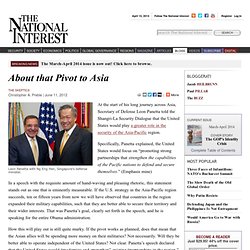
Specifically, Panetta explained, the United States would focus on “promoting strong partnerships that strengthen the capabilities of the Pacific nations to defend and secure themselves.” (Emphasis mine) In a speech with the requisite amount of hand-waving and pleasing rhetoric, this statement stands out as one that is eminently measurable. The State of the World: Explaining U.S. Strategy. By George Friedman The fall of the Soviet Union ended the European epoch, the period in which European power dominated the world.
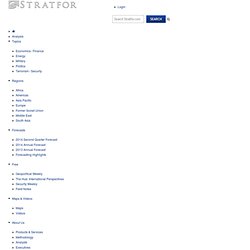
It left the United States as the only global power, something for which it was culturally and institutionally unprepared. The State of the World: Assessing China's Strategy. China Is No Longer Predictable by Robert D. Kaplan. By Robert D.
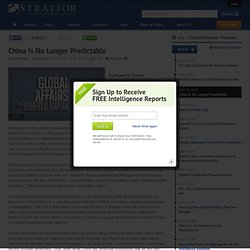
KaplanChief Geopolitical Analyst The United States has had it easy over the past third of a century in regards to China. Washington has been able to proclaim moral superiority over the Communist Party dictatorship in Beijing, even as those very dictators provided Washington with a stable, businesslike relationship that fostered immense opportunities for American companies in China and for the American economy overall.
China's rulers, ever since Deng Xiaoping consolidated power in 1978, may have been nominally communists, but they have also been professionals and technocrats who have ruled in a self-effacing, collegial style. Is America Pivoting to Asia Fast Enough? - By James Holmes. Over the weekend, U.S.

Secretary of Defense Leon Panetta delivered his first keynote address at the Shangri-La Dialogue in Singapore, an annual convention that hosts top defense officials from Asia-Pacific nations. Last year, the talk focused on allegations of Chinese aggression against Vietnamese survey vessels near the Spratly Islands, and sparks flew as China's Defense Minister Liang Guanglie spiritedly defended Beijing's conduct. This year, Liang was a no-show, and all eyes were on Panetta as he laid out the U.S. military's plans for putting some muscle behind the Obama administration's much-heralded "pivot" to Asia, unveiled by Secretary of State Hillary Clinton in Foreign Policy last November. Panetta used his bully pulpit to reaffirm American resolve in maritime Asia. Despite budgetary headwinds, he said, Washington will "rebalance" forces to keep faith with regional allies like the Philippines. Small-Stick Diplomacy in the South China Sea.
The China Bluff. Forty years ago, on a clear, cold afternoon in Beijing, I followed President Nixon onto the tarmac at Beijing’s Capital Airport. I have a belated confession to make. When I tried to sleep on Air Force One on the way to Beijing, I was jolted awake by a nightmare. I dreamed that Generalissimo Chiang Kai-shek would be standing there with his old political sparring partner and secret pen pal, Zhou Enlai. In my dream, Chiang stepped forward to greet his former friend and political backer Richard Nixon with a loudly sarcastic "long time, no see! " Robert Kagan on Why the World Needs America.